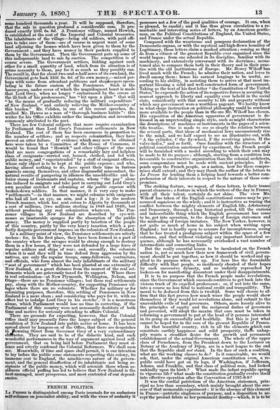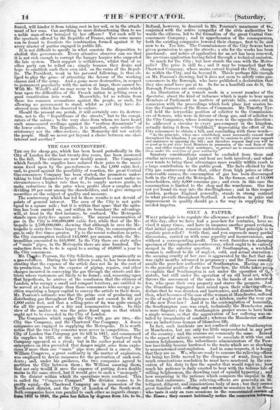FRENCH POLITICS.
LA PRESSE is distinguished among Paris journals for an audacious self-reliance on journalist ability, and with the vices of audacity it
possesses not a few of the good qualifies of courace. It can, when so pleased, be candid ; and it has thus given circulation to a re- markable and interesting series of letters, by an American gentle- man, on the Political Constitutions of England, the United States, and France under the actual Republic.
Compared with the wearisome and pompous declamation of the Democratic organs, or with the mystical and high-flown homilies of Legitimacy, these letters claim a marked attention ; coming as they, do from a citizen of the greatest Republic ever organized since the world began ; from one schooled in its discipline, familiar with its machinery, and extensively conversant with its doctrines ; accus- tomed also to compare them both in their theory and in their prac- tice with the old institutions of Europe. Mr. Henry Wikoff has lived much with the French ; he admires their nation, and loves to dwell among them : hence his earnest longings to be useful, ac- cording to his ability, in assisting them to arrive at that most im- portant blessing a solid and well-constructed form of government. Taking as the text of his first letter " the Constitution of the United States," he expounds the action of its respective forces in securing the nearest approach to liberty and equalit3, ever beheld in the social state, coincidently with that security to life and property without which any government were a worthless pageant. We hardly know in what shape instruction on political philosophy could be rendered more available to the people than in the one Mr. Wikoff has chosen. His exposition of the American apparatus of government is de- livered in an unpretending simple style, such as might characterize the descriptions of machines or instruments in the pages of a scien- tific treatise. One is made to see so clearly the relation between the several parts, that ideas of mechanical laws unconsciously rise to the mind, and we half expect to see an illustrative out, with "A the cylinder, C the fly-wheel, F the revolving pinion, H the valve-index," and so forth. Once familiar with the structure of a political constitution sanctioned by experiment, the French people will be furnished with a model according to which their own may be made to fit its purpose ; although, starting from a condition less favourable to constructive organization than the colonial architects, some compromises must be made with ancient principles. It de- pends upon the French people, as a nation, how far these compro- mises shall extend ; and they may thank the author of the letters to La Preen for lending them a helping hand towards a better com- prehension of their interests in respect to the nature of these com- promises. The striking feature, we repeat, of these letters, is their trans- parent clearness ; a feature in which the writers of the day in France, with all their talent, certainly do not shine. The view Mr. Wikoff has taken of the English constitutional course may be pro- nounced sagacious on the whole ; and it is instructive as tracing the conflict between the mighty elements of English life, Aristocracy and Democracy, through a long historical period, till the curious and indescribable thing which the English government has come to be, got into operation, to the despair of foreign statesmen and the misleading of foreign imitators. The New Yorker, however, is not quite so much at home in his subject when writing upon England ; but is hardly open to censure for incompleteness, seeing that he has treated a prodigious subject within the space of a few columns, and that without violating any important -historical se- quence, although he has necessarily overlooked a vast number of intermediate and connecting links. But the really essential lesson to be inculcated on the French nation is, not so much how their new framework of civil govern- ment should be put together, as how it should be worked and ap- plied to its purpose when set up. For here lies the formidable difficulty with that people, so insidiously cheated of their hopes by each successive dynasty, and so unfairly, reproached by lookers-on for manifesting discontent under their disappointments. It is to no purpose that the French people make revolutions, since the Government which succeeds contrives to get back into the vicious track of its expelled predecessor; or, if not into the same, into a course no less fatal to national credit and tranquillity. The moral to be deduced from this is twofold. Some will choose to af- firm that this fact proves how much wiser the people would show themselves if they would let revolutions alone, and submit to the unavoidable evils of bad governors. Others, more keenly alive to the principles of equity and the reciprocal duties of governors and governed, will adopt the maxim that care must be taken in reforming a government to put at the head of it persons interested in its going on successfully and healthily. But this is just what cannot be hoped for in the case of the present Republic of France.
In that beautiful country, rich in all the elements Fhich can constitute earthly happiness and solid prosperity, theYe unhap- pily wants a steadfast desire for the growth and permanent establishment of the actual Government. The whole of the upper class of Frenchmen, from the President down to the Lecturer on Botany at the Academy of Dijon, are in a tacit league to the end that the Republic shall not stand. In the face of such a coalition, what are the working classes to do P Is it conceivable, we would ask, that, under the original American constitution even, a re- public could have got on its legs, if Washington, if Jefferson, Adams, and Franklin, and that class of political men, had looked unkindly upon its birth ? What made the infant republic spring to vigorous life P what made the constitution gradually evolve itself into effective operation after the Convention of 1787-8-9 ? It was the cordial patriotism of the American statesmen, prin- cipal no less than secondary, which mainly brought about the suc- cess of that memorable experiment : it is the absence of this element in France—patriotic singleness of purpose, and a disposition to ac- cept the present fabric as her permanent destiny—which, it is to be feared, will hinder it from taking root in her soil, or in the attach- ment of her sons. Can anything be more disheartening than to see a noble man-of-war betrayed by her officers ? Yet such will be the spectacle offered by the Republic of France, unless some means can be found to frustrate the combination formed against it by every cluster of parties engaged in public life.
It is not difficult to specify in what consists the disposition to abolish this government. Every attentive observer can see that it is not rich enough to corrupt the linngry harpies who supported the late system. Their support is withdrawn, whilst that of no other party can be relied on ; simply because they desire and hope to establish each their own idol, on the ruins of the Repub- lic. The President, weak in his personal following, is thus ob- ••ed to play the game of attracting the favour of the working classes and of the army. And a game more destructive, in respect to permanent popularity with the nation at large, there cannot be. With Mr. Wikoff's aid we may recur to the leading points which bear upon the difficulties of the French nation in getting even a good constitution into work. Meanwhile, let us refrain from those too common accusationsagast the people, as such, for allowing no government to standin
, whilst as yet they have de- stroyed none which has deserved to endure. Should the present one perish, it will certainly owe its destruc- tion, not to the " Republicans of the streets," but to the conspi- rators of the salons ; to the very class from whom we have heard such unmeasured revilings against the " restless discontents" of the lower orders. The Republic, it is manifest, suits neither the aristocracy nor the office-seekers ; the Monarchy did not satisfy the people. Shall we never get beyond a choice between one class interest and another?































 Previous page
Previous page